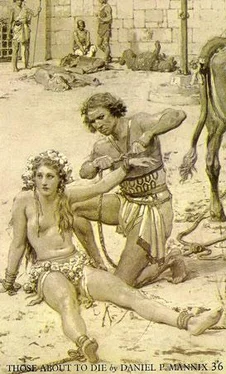Daniel Mannix - Those About to Die
Здесь есть возможность читать онлайн «Daniel Mannix - Those About to Die» весь текст электронной книги совершенно бесплатно (целиком полную версию без сокращений). В некоторых случаях можно слушать аудио, скачать через торрент в формате fb2 и присутствует краткое содержание. Год выпуска: 1972, ISBN: 1972, Издательство: Mayflower Books Ltd, Жанр: Исторические приключения, на английском языке. Описание произведения, (предисловие) а так же отзывы посетителей доступны на портале библиотеки ЛибКат.
- Название:Those About to Die
- Автор:
- Издательство:Mayflower Books Ltd
- Жанр:
- Год:1972
- ISBN:978-0583121347
- Рейтинг книги:4 / 5. Голосов: 1
-
Избранное:Добавить в избранное
- Отзывы:
-
Ваша оценка:
- 80
- 1
- 2
- 3
- 4
- 5
Those About to Die: краткое содержание, описание и аннотация
Предлагаем к чтению аннотацию, описание, краткое содержание или предисловие (зависит от того, что написал сам автор книги «Those About to Die»). Если вы не нашли необходимую информацию о книге — напишите в комментариях, мы постараемся отыскать её.
Those About to Die — читать онлайн бесплатно полную книгу (весь текст) целиком
Ниже представлен текст книги, разбитый по страницам. Система сохранения места последней прочитанной страницы, позволяет с удобством читать онлайн бесплатно книгу «Those About to Die», без необходимости каждый раз заново искать на чём Вы остановились. Поставьте закладку, и сможете в любой момент перейти на страницу, на которой закончили чтение.
Интервал:
Закладка:
Organizing these hunts must have been a tremendous undertaking. The catchers could demand that legionnaires stationed in their area help with the drives and the commanders had to co-operate, for getting the animals was crucial to the politicians in Rome. The whole civilian population could be drafted for this work and, as some of Cicero's angry letters show, this often crippled the local economy for many of these drives lasted for weeks.
As with all animal collectors, Fulcinius' main trouble was not in getting the animals but in shipping them. The animals had to be taken by ox cart to the coast or floated down rivers on rafts. This journey could take months. Fulcinius established way stations along the route where the animals could be released in large enclosures for periods of rest and exercise. According to Roman law, the villagers were forced to provide food for the animals, but collecting the food often proved so difficult that Fulcinius had to appeal to the local Roman garrison for help. If there was no garrison, he used his native mercenary spearmen who travelled with the animal caravans. These men were merciless. On one occasion they dug up corpses in a local cemetery and fed them to the animals. Fulcinius got frequent complaints from Rome but probably his invariable answer was: "Do you want the animals or don't you?" However, the situation got so bad that an imperial order had to be passed prohibiting animals being kept more than a week in any one resting station.
Even after the animals had been loaded on ships, the voyage to Ostia, the port of Rome, was a long and dangerous affair. "The sailors were afraid of their own cargo," wrote Claudian. The trip up the Red Sea was particularly treacherous because of the reefs and shoals. To make matters worse, the voyage had to be made at night and the ships tied up during the day to spare the animals from the heat of the sun.
As far as Fulcinius was concerned, a human life meant nothing compared to the successful shipment of the animals. Once when he was unloading cages on the docks at Ostia, a famous sculptor named Pasiteles set up his table on the dock and began making models of the lions. Fulcinius told the man to get out but Pasiteles refused. A few minutes later, a cage containing a leopard was smashed during the unloading and the animal nearly killed the sculptor. Fulcinius' only reaction was a blind fury at the sculptor for getting in the way. (This incident did happen although I don't know the name of the animal collector.)
It's rather interesting that some two thousand years later another animal collector made a great reputation for himself by capturing and importing animals under much the same conditions as did Fulcinius, supposedly for zoos, but actually so fights could be staged between the animals in corrals and pits for Hollywood motion picture cameras. The pictures of these fights were so popular that they are still appearing in re-run theatres and on TV. If you want to know what the Roman arena must have been like, tune in on one of these programmes. I saw one showing a fight between an African lion and an Indian water buffalo supposedly taken "in the heart of the Dark Continent" Of course, nobody cares whether the pictures are faked or not. Like the Romans, all they want to see is the fight. I've also seen pictures of "native spearmen fighting man-eating lions" which were staged by order of a local governor in Africa as a tourist attraction. The lions arrived in crates and the natives got their spears and shields through a European supply house. I've heard that three men died as a result of the fight. A good, average, arena spectacle.
How did a man like Fulcinius die? Probably of blackwater or malaria fever. Or perhaps he was one of the men who died in the mud-walled Roman fort some 250 miles north of Mombasa, the remains of which still stand. Mombasa was then the main port of East Africa and galleys waited there to be loaded with rice, sesame oil, ivory and wild animals for Italy.
The fort may well have been put there as a way station for the animal collectors. If so, the local tribes would have long learned to avoid the place; otherwise they might at any time be pressed into service to haul the cages, or their fields stripped to feed the wild cargo. So the fort would have been isolated and the sentinels have no warning of an attack.
Perhaps at dawn, a Masai war party suddenly rushed the walls, giving their terrible yodelling cries as they hurled their spears and then drew their simis (long daggers) for the close work. The fort covers some five acres and the garrison was not strong enough to hold all the walls. Fulcinius would have fought to the end, side by side with his native troops and his big Molossian hounds which he used to drive animals aboard ship and to bring quarry to bay. Probably his trappers fought with their hunting spears, while the legionnaires used their swords and shields. At the end, they were overrun. Now only a few coins, some from the time of Nero, some of the time of Antonius Pius, and one from the time of Trajan remain to show their fate. The victorious Masai left the coins on the ground, but took the valuable weapons and armour from the dead men.
CHAPTER FOURTEEN
Up until the second century a.d., there still remained some sense of fair play in the games. A gladiator had a chance to leave the arena alive. He could even insist that the lanista put a price on him and if he could raise the sum he was free. An animal generally had a good chance to kill his human opponent, so the contest was often fairer than a modern bullfight. There was at least a pretence that the games were still contests—bloody, brutal and cruel, but still retaining some idea of giving the contestants a sporting chance unless they were condemned criminals.
Gradually the games began to degenerate into spectacles of pointless massacre. People develop an immunity to scenes of cruelty and bloodshed and demand more and more ingenious methods to titivate their jaded interest. A favourite trick was to pit an armed man against an unarmed man. Naturally, the armed man always won. Then he was disarmed and another armed man sent out to kill him. This routine would go on all day.
Seneca, the famous philosopher, said of these exhibitions: "All previous games have been merciful, these are pure murder. The men have no defence, their bodies are open to every blow and every attack is bound to be successful. Most spectators prefer this to the regular duels of skill. They would! Protection and training only postpone death, which is what the crowd have come to see."
Exhibitions like this began to take the place of the regular gladiatorial combats. Actually, a fight between two trained and evenly matched swordsmen is about as interesting as a chess tournament. It can go on for an hour or more and there's comparatively little action until the final thrust, each man conserving his strength and feeling out his opponent with light jabs and thrusts. The early Romans were all swordsmen themselves and could appreciate the fine points of combat, but the mob wanted something faster and bloodier, much as modern sports fans want to see plenty of action in a wrestling bout whereas honest wrestling is a slow business and a man may take twenty minutes to break a difficult hold.
Also, the shows had constantly to be "bigger and better than ever." Every emperor had to outdo his predecessors. Barnum and Bailey's went through a similar period. I remember a time when there were seven rings all going at once and no one had the slightest idea what was happening. By the end of the third century, there were a dozen amphitheatres in Rome, most of them in almost continuous operation. Some of the best known were the Circus Maxentius on the Via Appia, the Circus Flaminus near the Circus Maximus, the Circus of Caligula-and-Nero where St. Peter's now stands, the Circus of Hadrian, the Circus Castrense (for the Praetorian Guard) and the Circus of Sallust. There was also, of course, the Flavian Amphitheatre or Colosseum. Emperors stamped their coins with the heads of famous gladiators rather than their own images, and politicians had the number of games they gave engraved on their tombs.
Читать дальшеИнтервал:
Закладка:
Похожие книги на «Those About to Die»
Представляем Вашему вниманию похожие книги на «Those About to Die» списком для выбора. Мы отобрали схожую по названию и смыслу литературу в надежде предоставить читателям больше вариантов отыскать новые, интересные, ещё непрочитанные произведения.
Обсуждение, отзывы о книге «Those About to Die» и просто собственные мнения читателей. Оставьте ваши комментарии, напишите, что Вы думаете о произведении, его смысле или главных героях. Укажите что конкретно понравилось, а что нет, и почему Вы так считаете.












